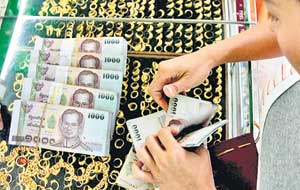
In Thailand, all that glitters is probably not goldBANGKOK, Feb 28 (Reuters) - Thailand's sluggish economy and record gold prices have prompted many elderly Thais to cash in family heirlooms as they struggle to make ends meet."This is family jewellery," said Thai-Chinese grandmother Pannee Sae Kaow, standing outside a gold shop in Bangkok's Chinatown clutching a tarnished gold necklace given to her years ago by her mother. "The economy has left me no choice but to sell it," the 78-year-old said forlornly. "Everything is more expensive and it's tougher to live in a time like this. We're not rich people."
Like many of Thailand's 65 million people, Pannee, who makes just 6,000 baht ($185) a month from a small dumpling stall, is not alone in battling soaring inflation stemming from high oil prices and an economy labouring after two years of political strife, including a 2006 coup. "I have to work so hard to keep paying my bills," said Jureerat Pongkum, who works part time at a Bangkok coffee shop. "Prices keep going up but the quantity of food or things you get is still the same. Our pay is still the same," the 24-year-old said as she wiped down a counter top. "This is my first job after college but it's not going to be enough. I'm looking for more part-time work," she said. "What can you do? You have to eat and live your life." The new government is talking up the economy, saying major public infrastructure projects in the pipeline will boost growth from a sickly 4.7 percent in 2007 towards 5.5 percent. Consumer confidence has started to tick up after two years of steady decline, but the domestic gold market — one of the more unusual benchmarks of Thailand's economic health — does not suggest a rosy outlook. Dealers say gold purchases are simply too expensive for most Thais and so dealers are melting down hocked jewellery and selling it abroad for gold value. The profit they make is from the government-regulated five percent discount to market prices they are allowed to pay customers selling rings, bracelets and necklaces. "There aren't many customers at the moment -- except for those coming to sell," said 40-year-old gold trader Montree. "Many people can't afford gold so we now ship it to elsewhere in Asia." International gold prices are hovering at a record high of around $955 due to strong demand from investors seeking a safe haven from a weak U.S. dollar and fears of a looming recession in the United States. According to Commerce Ministry figures, Thailand exported 76 tonnes of gold in 2007 -- an increase of almost 50 percent from the previous year -- suggesting the trend to cash in jewellery has been going on for at least a year or so."In just one day last month, we exported up to 500 kgs. How crazy is that?," gold shop owner Jinda said."Since the gold price rose over $800 an ounce, more people are selling it." Albert Cheng, head of the World Gold Council's Far East office, said Thailand showed a net investment demand of 18 tonnes of gold in 2007, far below India's and Vietnam's 56 tonnes, but near China's 24 tonnes."In this part of the world, people buy gold as an investment and they trade on it," he told Reuters."Particularly in Thailand, people like to pay their money and bring the gold home. When prices go up they sell it and take the money". "It's normal for Thai people to have gold jewellery, in particular in rural villages. That is how they accumulate wealth. When they need the money they just pawn or sell their jewellery". "I am not surprised they are selling because nowadays it is a very good price. But everytime we see a dip, people come back". |
|
||||||
|| Front
Page | News | Editorial | Columns | Sports | Plus | Financial
Times | International | Mirror | TV
Times | Funday
Times || |
| |
Reproduction of articles permitted when used without any alterations to contents and a link to the source page.
|
© Copyright
2008 | Wijeya
Newspapers Ltd.Colombo. Sri Lanka. All Rights Reserved. |
